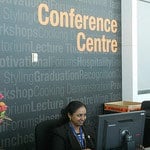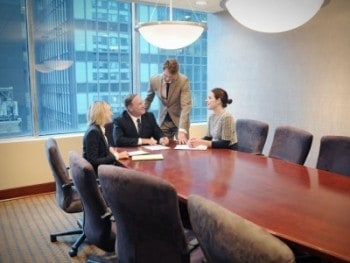Conference rooms are a commodity necessary to the success and image of an attorney. When one does not practice the appropriate etiquette with conference room usage, it can have a profound effect on your client referral stream. Rude behavior with conference rooms can defeat the whole purpose of using a shared office space.
For conference rooms, good behavior should be entirely obvious. Believe it or not, this is always the case.
At Law Firm Suites, we have developed a set of “house rules” for conference room etiquette. Following these eight rules will keep you in the esteem of your colleagues.
1. Leave the conference room cleaner than the way you found it.
It should be obvious that cleaning up after yourself is valued. Sometimes there is not enough time between bookings to clean the space yourself. If this happens, it is best to inform the receptionist of officer manager. Doing this allows one to avoid the embarrassment of having the occupant after you have to clean up your mess.
2. Making sure you schedule your meetings accordingly.

3. Don’t just assume an empty conference room is free.
Conference rooms can be booked using various types of computer systems. If you happen to see a conference room is not being used, do not just assume it is available for anyone and respect the schedule. Doing so prevents awkward situations with other tenants.
4. Do not use the conference room as your second office.
Large conference room tables are definitely nice to have. You can spread out, set down your Starbucks latte, and so forth. Especially when one is overloaded with paperwork, a conference room table is great.
If you have your own, by all means do it; however, if you share a space with other attorneys, it would be wildly inappropriate to engage in this activity. The rooms should be used for client or staff meetings so if the work can be accomplished at your desk, that is probably the best route to take.

5. Make sure you have not double booked conference rooms.
Checking the reservation calendar allows us to lessen the chance of double booking conference rooms. If you happen to double book, simply cancel the reservation so someone else can use it.
6. Book your conference room early, cancel early too.
Once you are aware that a meeting will take place, it is imperative to book the conference room at that time. A shared office space typically has the luxury of reserving the conference room days in advance. Waiting until the last minute means you may find yourself without access to a conference room which will inevitably fall on you. Also, if the meeting cancels, make sure you cancel the reservation immediately so someone else can use it.
7. If there is a issue with someone else conflicting with your reservation, ask the receptionist or the office manager to handle the situation.

8. Be accommodating.
If you’re meeting for two guests is reserved in a room that seats 16 and another room that seat four is available, offer to relocate your meeting to the smaller room or even your office is someone with a larger party needs the larger room. This will be seen as a favor and will come back to you in a positive way.



on said:
I wanted to thank you for explaining some etiquette that should be done in a conference room. You mentioned that you need to make sure you schedule enough time for your meeting. Maybe it could be good to see if there’s a way to calculate and figure out how long the meeting could go for so you know how much time you need.